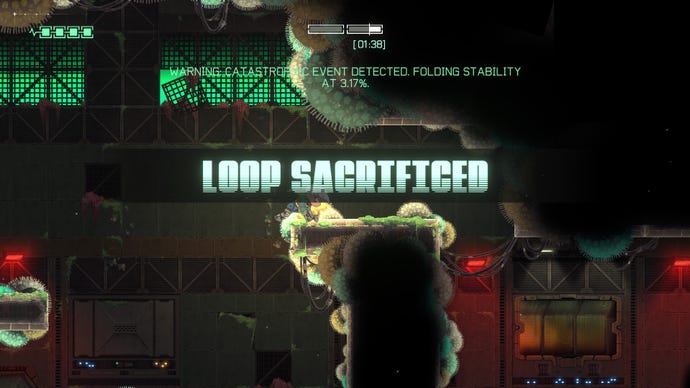HomeFeaturesEcho Weaver
Echo Weaver is an Outer Wilds-inspired metroidvania in which the only resource is timeClone survivor
Clone survivor
Image credit:Moonlight Kids
Image credit:Moonlight Kids

“All of the gates, all the progression, all the unlocks - it’s only knowledge,” says Chris Sumsky, one of three developers working on the game at MoonlightKids. “So everything you can ever do, you already can do, you just don’t know how to do it. If you think likeOuter Wilds, or Tunic, orThe Witness, where it’s all just secrets and knowledge - it’s that idea merged with platforming, movement tech, speedrunning, things like that.” This is a metroidvania without a progression system and only a smattering of tools with which to thread the inside of a setting that is constantly rewinding itself. I like what I’ve seen of the execution enough that I’m willing to forgive the use of “metroidBRAINia” (apparently it’s an established term?) in the marketing materials. I probably wouldn’t say that one out loud in front of a mirror either. Who knows what kind of cosmic vengeance it might attract.
Image credit:Moonlight Kids

You might remember Moonlight Kids as the creators of gambolling Pikmin-alikeThe Wild At Heart, whose enveloping magic forest can still be glimpsed in the new game’s overgrown setting. In Echo Weaver you are the titular Weaver, a clone who wakes at the heart of a lunar colony that has fallen to a mushroom apocalypse, with great pillows and carpets of pastel fungus slowly engulfing a 2D landscape of crackling circuits, spiked walls and sealed doors. It’s like they turned Jeff Vandemeer loose on Sonic’s Scrapyard Zone.
Time isn’t only gained, however: certain gates demand a tithe of seconds, for example, and deciding whether to hoard or spend time feeds into a wider background tragedy involving ancient ruins, alien DNA, religious zealots and micro-universes. Sumsky spoiled a little about the loop’s origins during my 20 minutes with the game - I won’t give it away, of course, but suffice to say that it made me sad. There’s a small cast of survivors to discover - including what looks like a grinning mutant cat fungus - whom you might help or save as you unravel the whole.
Image credit:Moonlight Kids

Time might be a literal currency in Echo Weaver, but the game’s exact scope is less romantically dependent on getting access to enough cash to flesh out the existing “system complete” build. Sumsky isn’t worried, however: he thinks the game should hang together well at several possible lengths. “It kind of depends on what level of funding we can get, but I think it would serve itself fine as like a 4-6 hour game - like, ‘that’s a cool concept game and I played it in a weekend and I had a great time with it’. I think it’s also well suited for a longer metroidvania, but I don’t think it necessarily needs to be long. I think my ideal would be somewhere between six and eight hours.”
If Echo Weaver is a tragedy, it’s also a game for everyone. “Our design philosophy is that the game is really accessible to anyone with a passing interest in games,” Sumsky says. “You don’t have to be a hardcore platformer fan to enjoy it and finish the main story”. This agenda notwithstanding, I found the demo reasonably challenging - you have to worry about stuff like poison gas, and there’s the odd precision-wall-jump section that reminds me of Celeste. Without going into detail, Sumsky adds that there are some optional elements and techniques that are more “for the hardcore and for speedrunners out there”: a practised player might “do all kinds of weird tricks to avoid repetition, and just enhance that sense of mastery”.
He adds that it’s been fascinating to explore how a metroidvania works, when you apply a timeloop to it. (Echo Weaver isn’t the first to try this: other examples includeUltros, which Katharine - RPS in peace -reviewedbefore she abandoned us to go hang with the cool kids at Eurogamer.) “What does that mean, both from the game design point of view and for how the progression works for the player?” Sumsky says. “Because everything resets every loop, and that kind of goes against everything metroidvania stands for in terms of power progression. So it makes for a really interesting challenge. How do you get the same dopamine hit, the same power scaling feeling while also taking everything away from you?”